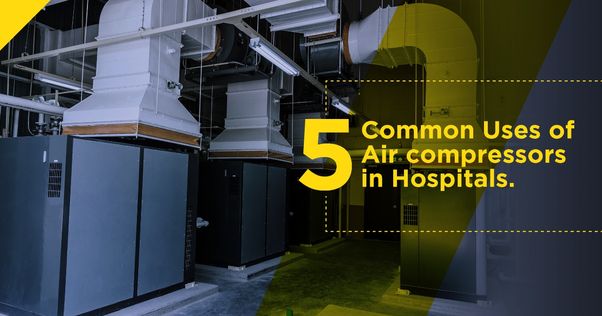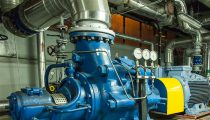When the time comes to determine the type of air…

5 Common Uses of Air compressors In Hospitals
Most of us do not realise the extent to which hospitals and healthcare clinics are dependent on a steady supply of clean & compressed air. Right from regular hospital maintenance, to emergency patient care systems, facility operations and more – air compressors find widespread adoption in a wide range of medical applications. Leading air compressor suppliers from around the world are coming up with advanced types of medical compressed air systems that deliver dry, contamination-free and completely odourless air for different purposes. We will here take a look at the most important uses of air compressors in hospitals:
Air Compressors In Hospital Operating Rooms
Right from ensuring that patients do not face any respiratory problems in critical/non-critical operation theaters, to maintaining the functionality & efficiency of medical handheld equipment – compressed air systems can be used for different purposes. Specialised air compressors are used for certain applications – like the use of oil-free compressors for the transportation of medical gases. An optimally functioning medical air compressor is particularly important to keep patients with respiratory infections and other breathing difficulties comfortable.
Hospital operating rooms have to be fully contamination-free (i.e., the air has to be free of all types of bacteria and virus). That, in turn, would rule out the possibilities of airborne diseases being spread, and resultant infections. To ensure this, the filter elements and the overall filtration system should be tested regularly – and replacements made, as and when required.
Air Compressors In Incubators & Ventilation Systems
In order to function optimally, respiratory circuits need to maintain a certain degree of air pressure. This is done with the help of oil-free compressed air systems (with Class 0 oils). The system needs to have the capability to let atmospheric air enter – and then, compress it and transfer it to the connected ventilator. Leading manufacturers of air compressors for hospitals ensure that their products supply the requisite air flows in a controlled manner, and the oxygen exposure concentration is brought down.
In this context, the reason behind the popularity of oil-free air compressors in medical setups also warrants a closer look. On average, oil-based medical compressors have much higher chances to develop technical and/or performance glitches – due to lubricant-caused corrosion (with system failures being the final result). Apart from having considerably lower breakdown risks, oil-free/oil-less medical air compressors come with easy controls and are more cost-efficient as well.
Air Compressors For Dental Treatments and ICUs
For all types of dental treatments in general, and dental surgery in particular, medical air compressors have crucial roles to play. The pure compressed air from these systems is used to clean the spaces between teeth – as well as for fluid-suction in an efficient & safe manner. In addition, hospitals often use compressed air to make dental drills work as required. Other handheld pieces & tools used for dental treatments can also be cleaned with the air flow from compressors. The fact that medical compressors are ergonomically designed and do not generate much noise makes them ideal for usage in indoor spaces (like dental chambers).
In the Intensive Care Units (ICUs) of hospitals too, air compressors are increasingly being used. Leading industrial air compressor suppliers, like Zentech Systems, make sure that their systems are able to maintain the critical oxygen levels and the essential air purity standards – so that patients with impaired lung capacities do not face any problems. Continuous functionality is a prerequisite feature of air compressors in hospital ICUs.
Air Compressors In The Neonatal Rooms Of Hospitals
The use of neonatal ventilation systems powered by air compressors is common in present-day hospitals and nursing homes. These compressors are, understandably, rather small in size – and they have the capacity to ensure uninterrupted oxygen supply to the newborns. More often than not, babies placed in neonatal rooms have serious lung problems, or have other potentially fatal illnesses – and the availability of pure air can be a true life-saver in such situations.
To ensure the reliability and overall longevity of medical air compressors, hospitals follow dedicated system maintenance protocols. Apart from changing air dryers & filters at regular intervals, the aftercooler drains also need to be inspected for defects, blockages or water/moisture-induced damages. Problems in the ring components and seal damages (if any) also need to be detected and repaired at an early stage.
Air Compressors For Systematic Filtration and Day-to-Day Maintenance
Maintaining air filtration hygiene at hospitals is of paramount importance. In other words, unless the air is contamination-free and dry enough, patients are likely to face problems – along with staff members, doctors and visitors (practically everyone present in the hospital). With the help of powerful compressed air systems, airflow stability can be maintained, and air purity levels enhanced. For people who have higher oxygen sensitivities, retention of the oxygen balance in the airflow is crucial.
In addition to assisting a myriad of healthcare procedures, high-performance air compressors are regularly used for general maintenance and cleaning purposes (of different medical tools & equipment). For instance, nail guns and impact hammers require a steady supply of compressed air to work optimally. These systems are also used for powering wheel chair pistons (pneumatic pistons), emergency medical mattresses, and the like. For regular building cleaning, maintenance and running repairs too, medical air compressors come in really handy.
Compressed air is also used in the Central Sterile Services Department CSSD department of hospitals in which medical/surgical supplies and equipment, both sterile and non-sterile, are cleaned, prepared, processed, stored, and issued for patient care.
The selection of air compressors for hospitals and clinics have to be done with due care. In particular, the full-load air capacity of the compressors has to be considered, along with the availability & usability, points of application, and the frequency at which the system will be used (i.e., whether continuous supply of compressed air is required or not). Many hospitals also use standby compressors – that serve as a safety buffer in case of power failures and/or failure of the primary system. Medical air compressors have well and truly become the ‘beating heart’ of hospital air systems – and with the advancement of clinical technology, usage of compressor systems in the healthcare industry is set to become more and more mainstream.





Thank you for your sharing. I am worried that I lack creative ideas. It is your article that makes me full of hope. Thank you. But, I have a question, can you help me?